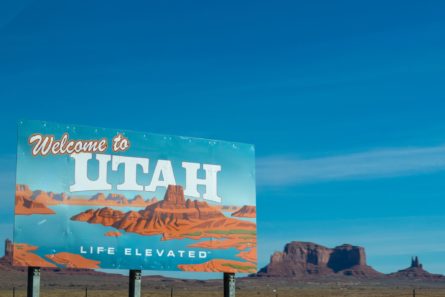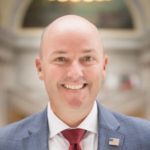Deep Dive Episode 221 – A Discussion on Occupational Licensing feat. Utah Gov. Spencer Cox

On June 7, 2022, the Regulatory Transparency Project hosted a live discussion on occupational licensing via Twitter Spaces.
Utah Governor Spencer J. Cox opened the program with remarks on licensing reforms his state has recently pursued, and an expert panel featuring Jon Gabriel, Scott Lincicome, Colin Mortimer, and moderator Shoshana Weissmann then broke down the Governor’s remarks and discussed the issue more broadly.
Transcript
Although this transcript is largely accurate, in some cases it could be incomplete or inaccurate due to inaudible passages or transcription errors.
[Music and Narration]
Introduction: Welcome to the Regulatory Transparency Project’s Fourth Branch podcast series. All expressions of opinion are those of the speaker.
On June 7, 2022, The Federalist Society’s Regulatory Transparency Project hosted a virtual event, via Twitter Spaces, on occupational licensing. The following is the audio from that event. We hope you enjoy.
Jack Derwin: All right. I believe we can get underway. Hello everyone, and welcome to this Regulatory Transparency Project Twitter Space. My name is Jack Derwin, and I’m an Associate Director of RTP at the Federalist Society. We’re very excited to host, and I’m sure it will be a fantastic program today on occupational licensing. We’ll have remarks from Utah Governor Spencer Cox, followed by an expert panel discussion.
Our host today, Shoshana Weissmann, is Senior Manager of Digital Media and a Fellow at R Street Institute. She has written for numerous publications, including the Wall Street Journal and USA Today, and her work focuses on the Supreme Court, social media regulation, and, of course, today’s topic, occupational licensing. With that, Shoshana, I’ll hand it over to you.
Shoshana Weissmann: Thank you so much for hosting this event. I’ve loved being a member of The Federalist Society, literally, since I was 16 years old. I’m that big a nerd. So it’s a real pleasure. And it’s even more of a pleasure to get to introduce Governor Spencer Cox today. I have an intro that I think gets to a lot of good parts about him.
So Governor Spencer Cox is a husband, father, farmer, recovering attorney, and Utah’s 18th governor. He’s a lifelong Utahan, aggressively civil, and might like Yuval Levin’s A Time to Build more than I do. He started his political career as a city councilman, and then did about just everything else before serving as lieutenant governor, and now governor. And there’s a few fun facts I wanted to share about the governor. His first executive order in his first hour as governor was on occupational licensing reform. And, as much as you might think, it wasn’t at my request.
Utah is the best state. That’s just another fun fact. Although, on the downside, Cox had said, prior to his being elected, that he wanted to show that, “We would represent all of Utah, not just the Wasatch Front.” I say this as a negative, because the Wasatch is my favorite mountain range. So before I introduce our panel and before we get into the panel, I’m excited to have the opportunity for all of us to hear from Governor Cox about my favorite topic, occupational licensing reform. Thank you.
It looks like there’s a little trouble getting the Governor to be added as a speaker. So, while we do that, and while we wait for him to have the blue little speaker thing next to him, I’ll also talk about the panel a little bit. So we’re going to talk about occupational licensing reform pretty broadly. And it’s a big issue with a lot of sides. It affects military spouses; mobility, generally, for all different kinds of people. Some licenses maybe shouldn’t exist, some should. And there can always be debate over it. But there are so many different sides to debate on, from criminal justice reform to the military spouse angle.
But our three panelists all come from different angles. And, for example, as the Director of General Economics at Cato’s Herbert A. Stiefel Center for Trade Policy Studies, he can clarify just about any economic issue, including this, for a reader of any level. Although, unfortunately, he’s kind of unkind to the frogs in his yard.
From Colin Mortimer, who not only shares most of a surname with a fictional turtle mayor in “Animal Crossing,” but he’s also a Director of the Center for New Liberalism at the Progressive Policy Institute, which seeks to develop a salient identity around the center-left values that have increasingly come under fire in the age of populism. His work and influence is wide-reaching, bipartisan, and collaborative.
And Jon Gabriel is the editor-in-chief of Ricochet and columnist at Arizona Central. He wears many hats and lives in Arizona, presumably with some javelina. He is a political writer and a marketing consultant. Until 2012, he was Director of Marketing for the Goldwater Institute. And he once also led marketing efforts for Cold Stone Creamery. And now that I just finished that, it’s perfect timing. It looks the Governor has a speaker. So I’ll go ahead and hand it off to him.
Spencer J. Cox: Well, Shoshana, I hope you can hear me. I’m so sorry that we had some technical difficulties, but I think we finally made it work. I am so excited to be here with you this morning. I appreciate that incredibly kind introduction from the good senator from East Virginia, one of my favorite people. And we’ve certainly had lots of fun discussions around so many issues, but especially occupational licensing.
My love affair with occupational license actually started about a decade ago, when I was serving as county commissioner at the time. But the state of Utah had been sued by somebody who was braiding hair for a living. And we had some very onerous occupational licensing requirements for braiding hair. People had to go to, basically, cosmetology school, over 2000 hours of required training, just to braid hair. Obviously, not just irresponsible, but certainly something worse; it felt like it was just completely harming the people who needed help the most, those at the margins, in a crazy, protectionist scheme that had been set up. And it just lacked common sense. It was crazy to me that you needed less hours to actually fly an airplane than you needed to braid hair in the state of Utah.
And so I was fortunate to get elected to the House of Representative about that time, as that lawsuit was progressing. And the state lost that lawsuit. I was lucky to serve as a freshman on our Business and Labor Committee. And we were able to push through legislation that changed those requirements so significantly. And made it much easier for people who wanted to braid hair for a living to actually do that without such significant state involvement.
From that time on, I’ve tried to be very wary of occupational licensing requirements in our state. And, as Shoshana mentioned, I was fortunate enough to be elected governor. And the very first thing that I did as governor was to require — my first executive order was to require a review of all of the occupational licensing requirements in our state, and to look for ways to change that.
But I have to be honest that that wasn’t enough for me, because occupational licensing creep is a real thing. And we certainly see that, even in states like mine, where we try very hard to watch out for those types of onerous and unnecessary requirements. They happen over time. Well-meaning legislators and others, and some not so well-meaning, I think, industries who want to protect their turf, continue to make it difficult every single year, more and more difficult for people to participate in our modern economy.
And so we decided this year to do a couple things. First of all, it’s important to mention that, like many states, our biggest problem right now, I guess aside from inflation, and actually, too, inflation, is a lack of people to participate in the incredible economic success that we are having. Utah has had the best economy in the nation for about the last ten years. We have the lowest unemployment in the nation. We’ve had the highest GDP growth, and the highest job growth.
We were the first state out of the pandemic to replace the jobs lost during the pandemic. And, together with Idaho, we have a significant lead on the rest of the nation when it comes to job growth. We’re at about four percent above where we were in 2019, when the pandemic started.
We just need more workers. And, too often, the occupational licensing requirements are making that part more difficult to fill those jobs. So we need more people.
Second of all, I wanted to find a way to institutionalize the review of occupational licensing requirements so it’s not just dependent on a new governor coming in or a group of legislators deciding it’s time to review this or that occupation. We wanted to institutionalize a way to prevent that creep from happening. And so this past legislative session, with some great legislative senators, Curt Bramble and Joel Ferry and some others, we were able to do a couple great things, so some really landmark pieces of legislation.
The first one was Senate Bill 43, which creates a pathway for people trained in other countries, including refugees — and Utah has been very open to refugees for many years — to obtain a license and allow these well-qualified individuals to fill in-demand jobs in our state and provide needed relief to our workforce shortage. They are often trained, they’re very talented, they’ve worked in other countries. And we’ve given a pathway for them to get the licenses they need to work here in the state of Utah.
The second piece of this, as I mentioned, is Senate Bill 16, which passed, this license reform bill to institutionalize these reviews. So, basically, sometimes you have to create more government to get rid of more government. And that was the case here. But the idea behind this is that we would set up, as part of our agency, every ten years, at a minimum, we would review every single occupational licensing requirement. And any new occupational licensing requirement that any legislator wants to propose has to go through this department that would then review all of the requirements. And I won’t go into those right now. But we have a long list, a report, that we have to give back that comes out.
We just hired the person that is going to run this office. They begin operations on July 1. And, I must admit, it’s the very first — this office is the first of its kind in the country, touches all state licensing. And any proposal, they have to go through this pretty onerous process. This is a way where we do want government to be very onerous. And that is in proposing new regulations, point out what the occupational and safety hazard really is and how intense it is and how this is going to affect the ability of people, especially those living at the margins, to be able to work in this space.
And so we want people to have to jump through every hoop. We want to make it as difficult as possible to propose new occupational licensing requirements and to keep old occupational licensing requirements. And we will then deliver those reports to the legislature to help them make better decisions as we’re reviewing the old requirements or any new requirements that come on board. And our hope is that this will give pause to legislators as they’re reviewing this. And only those that really do justify the types of requirements being proposed will actually pass the legislature.
So that’s just a little bit of a look into what we’re doing here in Utah. Again, so excited for this panel, and grateful for the work that is happening in this space. With that, I’ll turn it back to you, Shoshana.
Shoshana Weissmann: Thank you so much. And it’s so exciting to see Utah lead here. I really expected Governor Cox to do a lot of this work, but I didn’t expect it in his fist hour of office, which was pretty cool. But part of what’s valuable about his model is that it really does set up that process. And through my main job at the R Street Institute, we’re a big advocate of growing government to shrink it sometimes. And this is a great example of that.
I know I’ve already talked about our panel. And I’d like to start with my first question, because everyone seems to have come to this issue in a very different way. So I’ll start with Scott Lincicome. Tell me how you got into occupational licensing reform. And was it my Twitter?
Scott, are you there? Make sure to unmute yourself. If not, we can go to Jon Gabriel. Tell me how you got into —
Scott Lincicome: I got it. I’m here. Sorry about that.
Shoshana Weissmann: Thank you, Scott.
Scott Lincicome: Sorry about that. Anyway, it was not your Twitter account. But I do tip my cap to you as being kind of an OG occupational licensing reform champion, for sure. My original interactions with occupational licensing reform were actually personal. I was an attorney at a law firm in Washington D.C., toiling away, doing the big law thing. My wife got a job down here in Raleigh, North Carolina, where I now live. And we wanted to move. And the type of law I was doing, international trade law, was actually pretty easily done remotely.
And so, after getting approval from my firm to do this, we realized that the barriers for me to move just a mere four hours south, practicing international law, so not practicing North Carolina law or anything, were almost impenetrable. I had to get re-licensed. We had to do all this tax stuff. I had to pay thousands of dollars in fees to transfer my Bar license. I had to undertake dozens of hours of continuing legal education, costing hundreds of dollars per year. And this was a pretty significant impediment to my own ability to move and start a family down here in North Carolina.
And that that struck me as ridiculous. Ridiculous, not only personally — look, I was lucky. I was working for a large firm. They were graciously willing to subsidize all of this. But a lot of folks don’t have a giant law firm backing them financially. A lot of folks, particularly lower income folks, military spouses, and the rest, encounter these barriers every day and struggle to surmount them. Or maybe they can’t at all. And so that really was my initial foray into realizing a lot of the absurdity of occupational licensing and the desperate need for reform.
But, since then, as I’ve kind of continued my policy journey, I’ve realized the extent to which occupational licensing is a barrier for all sorts of the type of economic dynamism churn that we want to happen in a market economy. There are all these disruptions out there arising from trade or automation or just natural change in consumer taste. And then we have licensing, among other barriers that really prevent individuals from moving to a better town, from starting a different job, from going out on their own and starting a business.
And, again, these disproportionately burden lower income folks or people with criminal record, or, again, military spouses and the rest. And you see that if you were to create kind of a top-five list — I love top-five lists — of government-imposed barriers to economic dynamism and innovation and growth, licensing would have to be near the top, particularly given how it has proliferated in recent years, to the point that it’s covering about 25 percent of jobs.
So that’s my kind of initial journey in this space. And I pass it back to y’all.
Shoshana Weissmann: For sure. I’ll just jump in quick before I go to Colin. So, it’s funny because lawyer licensing reform has kind of become possible over the past few years, especially as the Bar failed so miserably during the pandemic. I mean, I know it’s vulgar, but, like, you had stories of people peeing in their seats because they were so afraid to be out of frame during the Bar exam, because it’s recorded. And you have to sit there, and you can’t look out of frame.
So, from that to the fact that, hey, lawyers are kind of the same everywhere, there’s been a lot of thought there. There’s logical push-back, too. But it’s kind of opened up interest here, in a way that it hadn’t been before. So it’s interesting that you came to it through there. And there’s kind of that opportunity now. I’m actually working on a paper on the subject.
But, Colin, tell me about how you got interested in it.
Colin Mortimer: Thanks, Shoshana. And I really appreciate you including me in this panel. I love this issue because it’s one of these issues that we really find bipartisan support for. I’d be remiss not to mention our friend Jared Polis, who has also done great work in the state of Colorado on occupational licensing reform. We came to this issue probably very early on in our organization. We started in 2017. I’d say, probably around then, if not 2018, we really started banging the drum of how insane it was that to be a hairdresser you had to do all these hours of training. To be a florist, you had to do all these hours of training. And then, God forbid you decided to move over state lines. You’d have to do that training again.
And we just basically said, “Hey, this is bad economics. This is bad policy. This is anti-poor. This is anti-working class.” And then, COVID came around. And that really vindicated what we’ve been saying for years. Because you had healthcare workers who had to go to different states, wherever the pandemic was really popping up. And states were rushing to tear down these occupational licensing laws. It’s kind of ironic that these states will say, “Oh, we need to license hairdressers, because health and safety.”
But the second there’s actually a pandemic and a healthcare crisis. They’re like, “Oh, the people who are working on the frontline of healthcare, they don’t need occupational licensing.” So it really makes clear and lays bare how these laws really are less designed to preserve safety and healthcare, and more to just, basically provide a benefit to incumbents and people who have been in the field for longer, and lock out people who are poor or can’t afford the training.
But then another thing happened, which is inflation and worker shortages. And that has also really laid bare how desperately we need occupational licensing reform. We have shortages in so many different sectors, but especially sectors that have a lower barrier of entry, or are working class, or have lower wages. But states still have these laws on the book that make it so, so, so, so hard to get these jobs or move to a state where shortages are more acute.
So, every day, I feel like there’s another example of why this issue is so important. And we’ll continue to yell from the rooftops, mostly on deaf ears, about how important this is. But I do hope that the COVID pandemic and the subsequent inflation crisis and shortages really are waking up lawmakers and policymakers to how necessary [inaudible 00:19:00] in this space are.
Shoshana Weissmann: Absolutely. And, also, it’s funny, florist is how I got into this. Clark Neily, who, at the time, was at the Institute for Justice, got me into this issue when I heard him speak about an elderly widow who only had one way to provide for herself, because it’s the only thing she knew: how to arrange flowers. And the government wouldn’t let her do it. And she failed the licensing exam. And it’s not because arranging flowers is particularly dangerous or complicated. I mean, you can do it poorly. You can do anything poorly. But it’s not going to harm someone if they get bad flowers, I guess. But the ridiculousness of it, and that when she passed away, she was in poverty, that really, that was kind of the end of it for me. And I’m like, well, this is what I’m doing with the rest of my life. So, it’s funny. It’s that same story that got me into it.
Governor Cox, actually, if you’re still around, I’d love for you to weigh in on how you got into the issue to begin with, if it was what you found in Utah, or if you had heard of it before, or, as a lawyer, if that was part of it for you as well.
Spencer J. Cox: Sure. I appreciate that. So, definitely, my time as a lawyer, as I was looking at the landscape, and I studied in Virginia, came back to Utah to take the Bar, and had some questions, much like Scott, about how this all works, and whether it made sense. But, to me, the shocking part was in the — was, as I mentioned, in the hair-braiding space, when I started to see the crazy requirements that just didn’t make sense.
My own sister was going to cosmetology school at the time, and her husband was studying to be a pilot. And they pointed out to me that she had more practice requirements than he did. And that just, the absurdity of it all, just made no sense to me.
And then really focusing on the military families as well, as I had friends who were in the military, and their spouses, as they were traveling around the country. And, whether they were teachers or hairdressers or whatever it was, the absurdity of them not being able to do what they knew how to do, and impacting those who are serving our country. It was just astonishing to me. And that’s where I really decided to get involved.
Shoshana Weissmann: Thank you so much. And I can’t thank you enough for sticking around to talk with us more. And now, Jon, so we mentioned Governor Polis, who, as well, is awesome on occupational licensing reform. But, Jon, you have a couple of connections to Governor Ducey. — Cold Stone. So was it the gov- — Cold Stone who got you interested in this, who’s also great on this? All the work you do, you’ve done so much, and you’ve been all over, always very closely tied to Arizona. But you’ve done so much. So tell me how you came to this issue.
Jon Gabriel: So I’m definitely the lay person. I think I was asked to speak — looking at the fine qualifications of the other speakers, I think I’m here as comic relief, perhaps. But I’ve always cared about this issue. And, yes, I worked before I got into policy or writing about politics or anything like that, I was in the private sector. And I happened to work running a marketing wing of Cold Stone Creamery, where Doug Ducey was the CEO. And I didn’t know his politics or policy chops. He didn’t know mine either.
And, years later, he was elected treasurer, and then, governor of Arizona. And I had kind of had it with the business environment and problems there. So I officially joined the Goldwater Institute as Director of Marketing there. So my job there was, basically, promoting what, shockingly, some people view as a dry issue, and make it more compelling, which was actually easy with occupational licensing, because it affects so many people who are just trying to put food on their table. These days, they’re just trying to fill their tank. And the government is standing in their way all too often.
So I first got really educated on the issue with the Goldwater Institute, and helped promote that issue there. And then, as well, later on, we had Governor Doug Ducey, who was really — some of the first work that he did. It seems like the Western states have been fantastic on this issue: Governor Polis, Governor Cox, in Utah. But just realizing that it doesn’t matter what party you belong to, if any. It doesn’t matter if you consider yourself left, right, or center. You’re just trying to help people do some work and help out their neighbor, help out people in the community. And it really is, it’s one of these issues that it’s kind of shocking that people could even oppose reforming occupational licensing.
But it’s really good to see, especially from my vantage point, the Western states, see people out there helping out, as it’s these interventions by government that’s really regressive in its impact. It really affects people who don’t have a lot of time for, and money for education. Cosmetology, the governor, Governor Cox had mentioned earlier, is a fine example of that. I can understand needing some training and some professionalism. On the other hand, here in Arizona, shortly before Governor Ducey was elected to office, you had someone who was working in Tucson Arizona, cutting hair of homeless people to kind of make themselves look better, feel good, maybe get that first job interview on their road to full employment. And the state cosmetology board at the time was shutting that person down, and threatening lawsuits against him and the like. So it’s one of these issues. Governor Ducey stepped in, and that was all reversed.
He’s been very aggressive on improving the environment for people working. If you have a certification, you have a license for another state, in any area, really, Arizona will recognize it. It has boosted jobs here. Our economic record has been fantastic. And it’s just a win for everybody. And it’s good to see governors where — you read the news about Washington D.C., and nothing gets done. And the only legislation passed seems to be trillion-plus dollar omnibus bills, maybe once a year. It’s great to see governors, legislatures around the country just say, “Hey, here’s something that the vast majority of us can agree on, and we can actually help people and get government the heck out of their way so they can provide for their family and build a career for themselves.”
Shoshana Weissmann: No, that makes a lot of sense. And I’m so glad to have you with us, especially because you come from a background similar to mine, where, at the R Street Institute, I promote a lot of our work. But I’m not always the one doing it. And it kind of gives you a special vantage point where you combine your understanding of communications with that of policy. And I think it gives CUA a kind of special place here.
So, for my next question — and it’s open to any of you would like to take it — what do you think is next for licensing? Where do you think we can convince people towards our side, or are there people that we haven’t engaged, who we should be engaging, in the same way that Governor Cox mentioned refugees? And I think that’s a really important angle. But it’s such a complex issue. So I’d be curious where you think there’s opportunity next.
Scott Lincicome: Shoshana, it’s Scott. I can go ahead there.
Shoshana Weissmann: Yeah.
Scott Lincicome: It seems to me the easily lowest-hanging fruit here is some sort of mutual recognition or reciprocity system, similar to what Arizona did, and others, that basically says, “Look, if you’re licensed anywhere in the country, you’re licensed here.” I think that’s the easiest, because it doesn’t deal with some of the thornier consumer welfare issues that come up with just simply repealing licensing altogether, which, of course, would be great, I think, in a lot of cases. But that’s going to be more difficult.
By contrast, just simply recognizing the licenses of other states, and the competency of other licensing jurisdictions seems a lot easier. And I think it would achieve some of the goals that we want, in terms of economic mobility, physical mobility, that kind of stuff. The other area that seems really ripe for reform is on the criminal justice side. The really pernicious effects of certain licensing regimes on the ability of people with very minor criminal records going back a long time to enter a licensed profession really is a significant economic, social, and, I think, moral problem.
And there would seem, I think, given recent criminal justice trends, that would seem to be another area that you can — you need cross-pollination, of sorts, that you can get criminal justice folks and labor market folks, and licensing reform folks, all on the same page. And then maybe push something there, in a bipartisan manner.
Shoshana Weissmann: Definitely. I think universal licensing recognition has been a real winner, especially because it came — the first instance of it was via Governor Ducey, literally months before the pandemic, where you already had a process in place to say, “Hey, if you’re licensed here, you can be licensed here,” which wasn’t really a thing prior to — it wasn’t a thing prior to when he did that at all. Colin or Jon, do you have something to add? Would you like to talk about what you see as a next frontier, especially you, Colin, too, thinking about the left?
I feel like it tends to be a right-leaning issue, not that it has to be at all. Governor Polis has been a champion. Governor Tom Wolf in Pennsylvania has been really interested in this. But I wonder if you have more to say there, from your neo-liberal center-left perspective, or Jon, from your Cold Stone perspective — no, I’m kidding, from your wide vantage point, knowing a lot of different issues too, for whoever would like to take it.
Colin Mortimer: Thanks Shoshana: Yeah. I’ll hop in for just a second. And, first, just ditto basically everything Scott said, because he took the words out of my mouth. But I do want to add one thing, which is, I just keep beating this drum about inflation and the political liability that it poses, that, if Democrats are looking for short-term fixes for inflation, especially addressing the labor shortages, this is low-hanging fruit that could make an impact tomorrow.
Inflation’s a tricky issue. A lot of the fixes for it take a while, or hurt people. But just saying, “Hey, if you are someone who works in another state, and you want to come work in our state, you’re allowed to, and you don’t have to get re-licensed. You don’t have to do these hours of training.” And that’s going to help inflationary pressures. So I think democrats should be doing this today. They should have done it yesterday, for other reasons, but especially considering that the biggest issue facing them in the upcoming elections is inflation, they should be really trying anything. And this is a really, really, perfect policy for them to take on.
Shoshana Weissmann: Yeah. That’s a really good point. Especially, like you were saying, with inflation, there’s a lot of different options, but there’s a lot of cost to them, as well, unfortunately. But, yeah, this is a kind of like stress-free way to do it. And, to his credit, President Joe Biden has expressed interest in this. President Barack Obama also had a big occupational licensing reform report, kind of explaining how this could all work, and President Trump, as well.
So there’s definitely interest, but not a ton of movement up there. And one more question for whoever would like to take it as well, what do you think is the best argument against licensing reform? Is there an argument where you hear it and you’re like, “Uh-uh, maybe we shouldn’t do this,” or “I’m not with you, but I kind of get it”? So, be your own devil’s advocate, and tell me what you think the best argument against it is.
Jon Gabriel: This is Jon Gabriel. It’s really hard for me. Something I always try to do is if I’m writing an article about an opinion, I usually want to steel-man that argument, not address the easy-to-knock-down points of any opponents the issue might have, but basically take their best shot and use that as my challenge to convince that person. But it’s really difficult to with this issue. Now, you can have occupational licensing for, I don’t know, a neurosurgeon or something. Or you can be in a situation where it’s for a florist. So there’s so many different layers to this, and so many great ways to innovate on it, especially on the low-hanging-fruit-type things.
And that’s what you’ll usually see places like the Goldwater Institute, when they’re addressing this issue, they will focus on the cosmetology, the florist, or some of these kind of low-level things, where it just really hits people in the “right versus wrong,” before you even get into policy arguments. It’s like, oh, come on. This is an African hair braider who wants to help out her community. Why don’t we let her do that? It’s not that big a deal.
But I can definitely understand safety issues, and making sure that everything is addressed. Even in cosmetology there are health and safety that you want to look out for. But it’s a very easy issue for us to defend. And it’s very difficult to challenge it without seeming like you’re missing the point by not letting people get work.
Scott Lincicome: It’s Scott here. I would just add to what Jon was saying. I think the steel man argument relates to informational asymmetries out there, that consumers lack the information needed to make wise choices about certain licensed professions. I think it’s very difficult to make that argument for hair braiding or something, but, certainly, there are others where you can say that it’s difficult to divine the skills and competency of certain licensed individuals.
Now, saying that, I have to add — I think they’d probably take away my Libertarian card if I didn’t — that the arguments these days are severely diminished by the omnipresence of the internet. We all walk around with portable supercomputers attached to all knowledge ever created, in the palm of our hands. It is extremely easy for people to get the information they need to make wise choices as consumers.
And then, of course, there’s all sorts of other traditional methods of doing that. But if I were to steel-man the argument, I think that in certain professions where there is a potential safety issue, where there is a potential informational asymmetry, that’s probably going to be your best argument. But it strikes me as pretty, pretty, weak, except for a very small handful of occupations.
Colin Mortimer: I will echo noted Libertarian Gary Johnson during the Libertarian Party debate when he said that he’d like to see some basic competency from people behind the wheel on the road. I think basically the same thing applies to people who have people’s lives in their hands, like pilots and doctors. But then, really, after that, I think the case for occupational licensing gets pretty flimsy.
Shoshana Weissmann: What about this argument? How about when people are like, “Oh, well, it raises wages. And you don’t want people to be making low wages. And maybe this is a way around mandating a minimum wage for those who oppose it. Maybe this is how we increase wages.” Or what about the argument that, basically, people of color who sometimes have trouble gaining appropriate credibility, just like anyone else, sometimes find that through licensing, where people are likely to trust them more. Those are two arguments that I find people in good faith will often bring up, saying, “Hey, well, what about this?” Do you have a response to that?
Scott Lincicome: Scott, here, again. I mean, sure. Being in the club is good for the club members, or can be potentially good for the club members. But that has to be balanced against all of the people trying to enter that club and prevented from doing so. This is NIMBYism, protectionism, you name it. You’re going to have concentrated benefits for a few winners, but diffused costs for far more. Of course, the people on the outside also tend to be lower income, disadvantaged in some way.
So you take that kind of moral or ethical side, and you combine that with, I think, the broader economic problems of this type of protectionism, that restricting mobility, restricting job growth, restricting innovation in the industry, restricting entrepreneurship. All of those types of things that harm state economies and the national economy have to be weighed against a potential wage bump for a protected member of the club, along with, again, all those moral and ethical issues as well.
Shoshana Weissmann: Perfect. Jon or Colin, before I move on to the next one, feel free to jump in, and interrupt me while I’m, well, we’ll go into the next one, too. Yeah, I think those tend to be the most arguments that I see in good faith. People who really want to do well for others, but maybe, I’m not sure I’d agree with it, but you can kind of get where they’re coming from.
What about, what do you think is next for licensing reform? Obviously, we’re seeing some movement with universal licensing recognition. Do you think the future, the smart way to proceed would be to try to get that in every state? Do you think there’s other reforms that we should be thinking about, whether it be lawyers or doctors? Not saying we de-license doctors. But, like, maybe we allow immigrants to work.
And think about this too, in light of, as Colin was saying, the labor shortage with inflation. Are there smart ways to go after this, in light of other bigger problems, or even just other opportunities, such as those created by the pandemic, where, like, people couldn’t move for multiple hours during the Bar exam, or things like that? Are there other things here, that you think it would be like a prime time to —
Colin Mortimer: Yeah, I’ll offer my thoughts very quickly. Like I said earlier, I think universal licensing state-by-state is really probably the next step. You have a lot of governors who I think would be keen or inclined to adopt this. Governors tend to be a bit more rational and level-headed than the federal government. But I do think that certain areas that were really impacted by the pandemic really just have a good case from the public of being adopted. Healthcare, again, just really jumps to mind, because people really saw, in their face, just how bad healthcare shortages during the height of the pandemic were impacting people.
There’s no reason why a foreign-educated doctor shouldn’t be allowed to practice in the United States with a minimal amount of additional training. And I think that’s really the stuff that occupational licensing reform people should be banging the drum about. So I’m optimistic for the future. It looks like this is an issue that’s moving in the right direction. And it’s thanks to the work of people like you, Shoshana, Scott, and other really great thinktanks for pushing this to the forefront.
Shoshana Weissmann: Thank you. I would like to thank myself too. No, I’m kidding. No, there’s so much work that’s been done. And I’m just thankful to be a part of it. Scott or Jon, do you have anything to add? Or are there new groups we could be tapping here, too, for support, whether it’s the natcons or populists? Because it seems like some of them do have in interest in licensing reform. And especially with labor shortages, I think that might be a way to kind of poke them and be like, “Hey, here’s an opportunity.” But, yeah, do either of you want to weigh in?
Scott Lincicome: I can add a couple things. First, in terms of other low-hanging fruit, the other area that seems to me to be a no-brainer, or at least an easier lift, is on some sort of independent review of licensing after a set period of time. You have kind of a sunset, where the license regime exists for a decade or whatever, and then is subject to a mandatory review by an independent panel to look at kind of costs and benefits. That, again, strikes me as easier than just simply repealing these things outright. It also provides more of a transition for folks in the protected class to realize that there might be a change in more competition coming soon.
In terms of groups, look, everybody is focused right now, whether it’s natcons or folks on the left and the right. It’s about pro-worker policies, even amidst the labor shortage, right? And occupational licensing, again, strikes me as a really important pro-worker reform, in the sense of allowing individuals to enter occupations, whether they’ve been disrupted, again, by trade or automation or whatever, able to change careers and better themselves or move to a better place.
And so often, in the current system, occupational licensing rules prevent that, or at least make it really difficult and costly, pretty easy for a guy working for big law, not so easy for a sole proprietor or, again, somebody in hair braiding or something like that. And so, to the extent that these can be couched as pro-worker policies, then I think there is potential traction there.
Shoshana Weissmann: Thank you. And yeah, before I move on to my next question, too, since we have about 15 minutes left, if people have questions from the audience, feel free to, like, raise your hand thingy in this. But once I click on you, just so you know, you have to click “accept.” I guess it’s like so that if you’re doing something else random that’s loud, it doesn’t interrupt it. But, yeah, feel free to chime in and ask questions.
But Jon, I’d be curious, is this an issue that you see popping up a lot? You reach so many people, do people bug you about licensing reform a lot? Is it something that you’ve seen increasing in interest or decreasing in interest? So I’d like to hear about more, how much you hear about it, what people are most interested in when they reach out about it.
Jon Gabriel: Yes, it definitely is coming up more. And I think a lot of that has to do with the shortage of labor that we have available throughout the country. Obviously, locally, it affects sunbelt states because we have such a transient population. People are always moving in and moving out of sunbelt states. And so a lot of people are very concerned about it, especially people new to Arizona move here from — the Chicago area is a very popular starting place to flee, basically. That’s what my family did when I was, I don’t know, six years old or so.
But they’re usually just thrilled that Arizona is so open about it. And if you have a certification in your home state, it’s accepted here. And that’s very positive for people. I think it is something that’s coming up more and more, because we just need to — this is just a great area for government just to get out of people’s way and not more of the fringe. When people look at the average Democrat or Republican who isn’t that into policy, let’s say, and they’ll think Libertarian, and they’ll say, “Okay, some of their ideas are a little far out there.” But this really is something that unites everybody.
I think both parties and Independents, which I know in my own state and most of the country, if you want to consider independence of party is the fastest growing party, definitely out here, with almost a third of registered voters being Independent, people are craving solutions that aren’t about kind of a pose, and own the libs, or own the cons or things like that. We have real problems out here. And people just want solutions. And the more of these we can get done throughout the country, the better it is.
And then you just have the entire concept of federalism. And that’s something Governor Ducey has been very aggressive in, is just realizing — as he mentioned early on, he thanked Gavin Newsom repeatedly for being his chief economic development officer. Because so many people are fleeing California for more, I wouldn’t say business-friendly, but worker-friendly climes where government isn’t trying to interrupt your side hustle or the career that you want to work in. So it’s good to see other states jumping on board, but I definitely do see more interest in this as an issue. And I’d like to see it go more nationwide.
Shoshana Weissmann: You keep bringing up Governor Ducey. And I love the example of him helping the man who was cutting hair for the homeless, especially because it touches upon so many facets of licensing reform. So he was actually studying to become a cosmetologist. And the cosmetology board was like, “Oh, you’re not a full cosmetologist. If you don’t stop cutting hair for the homeless, we’ll never give you a license,” which is a move. It’s not what I would have done. And Governor Ducey said, “Hey, this isn’t appropriate. He’s trying to help people out.”
And there was a hit piece published about a year later, on him. And it was saying, “Oh, well, the man trying to cut hair for the homeless had a criminal record.” And Governor Ducey is like, “Yeah, I know. Second chances matter. I said I’d support second chances, and guess what? I actually do.” And it got to the point where it shouldn’t matter if you’re cutting hair after you’ve been in prison, or after you’ve committed a crime. Getting back on your feet is a good thing. But it’s interesting, because I feel like Governor Ducey’s approached licensing reform from just about every angle.
One other thing he’s done a lot of too, is telehealth reform. And it gets to the point that there’s a lot of different policies that are kind of around licensing reform, but aren’t quite licensing reform, whether it’s –even zoning reform, in a way. You have to only live in a certain kind of place if you want to — or home-based business reform, where you can’t always work from home. And with zoning, a lot of times you can’t have mixed-use in the same area, which is, for some people, kind of silly, or telehealth, where it’s not quite licensing but it’s sort of licensing, because you have to be able to be licensed in the same state as the person — where the person’s located, in order to give them telehealth services. Or even trade policy in a way, sometimes gets into those big barriers.
So I’d be curious what you think the next issue that could kind of align with this is, whether it’s telehealth or zoning, or if it’s kind of like an “all of the above” thing, where it’s like, “Hey, we’ve had success with showing people why licensing reform matters. Maybe next we kind of popularize zoning reform.” Or telehealth is really just closely tied in. What do you think is another issue that’s just really, really close to it, and could kind of appeal to the same people?
Jon Gabriel: Well, this is Jon again. I can just jump in quickly on this. Somebody who worked at the Goldwater Institute with me, Stephen Slivinski, he’s now with Pacific Legal, and he’s done some fantastic reports and studies on how occupational licensing reform reduces recidivism rates with people who need those second chances, as you mentioned this guy giving haircuts for homeless.
By lowering the bar for people to get gainful employment is a very powerful way to make sure they keep on the straight and narrow. And a lot of people make mistakes, especially very early in life, and are sentenced and released. And this is a great way for folks in that transition, for, basically, stepping out of prison and very quickly getting into a job where they can make an honest living for themselves. So check out those reports. I think that is an issue that’s underdiscussed.
Shoshana Weissmann: Yeah. Steve Slivinski does awesome work. I’ve relied on a lot of his reports in the past. Scott of Colin, do you want to talk about zoning, trade, and issue that I’m missing?
Colin Mortimer: Go ahead, Scott.
Scott Lincicome: Oh, okay. Well, I think you nailed a couple of them, Shoshana. I think land-use reform and telehealth are really two big ones that really fall into very much the same bucket. Looking at land use, it really checks all the boxes about enriching members of an exclusive club, but keeping a lot of outsiders, well, out, and, typically, those that are more disadvantaged than the club members, and then imposing all sorts of broader economic harms on, again, physical mobility and kind of national economic growth and the rest. Telehealth, very similar, and I think telehealth really fits in more also with remote work more broadly.
Let’s face it. Remote work has exploded during the pandemic. I was an OG remote worker going back now more than a decade. But we need to reform certain federal and state laws related to remote work that can allow that to happen more easily. And tax laws are a mess when it comes to remote work. States are trying to claw back some of those tax dollars, even though people aren’t working in their states anymore. And that’s, I think, another area where it is really ripe for reform, along the same lines of kind of empowering workers and consumers in ways that improve their lives.
Colin Mortimer: Yeah, I’ll try to put to put a bow on this, to a degree, which is just to kind of highlight the in-vogue way of talking about these issues, which is supply-side progressivism. And I think this really encapsulates all the issues we’re talking about, whether it’s housing supply, or worker supply, which is this idea of like people on the left for a long time have subsidized demand. But we are reaching a point in which we need to increase supply. And this has been an issue for a long time. But, again, going back to inflation, it’s really highlighted how acute this issue is.
So I think it’s just, this is the new thing that people really should be focusing on, is like, how can we increase the supply of things that people need every day, whether it’s healthcare, whether it’s hairdressers, whether it’s florists, whether it’s housing, whether it’s this, that, and whatever? We should always be trying to find ways in which we can increase supply without necessarily harming workers, harming the quality of the goods, harming health, safety, what have you. I think it’s one of the most pressing issues of our time. And I’m really glad that not only are people on the center-left adopting this, but that there are allies within the Libertarian movement and the center-right who are also talking about this.
Scott Lincicome: Yeah, we libertarian supply-siders are “welcome you to the party” pals.
Colin Mortimer: We’re latecomers, but we’re —
Scott Lincicome: Hey, we’re happy to have you. Better late than never.
Shoshana Weissmann: I love this. This has to be one of the most friendly panels ever. But it’s funny, too. One thing I actually wanted to add in from Scott’s story is that back — I think this is 2018 or 2019, so very not long before the pandemic. The Goldwater Institute was highlighting this case about, I want to say it was a local Arizona town — so, it’s not governor Ducey’s fault, to his credit — where they were trying to prevent a woman from working from home. So first she had a couple of colleagues working with her from home.
And they’re like, “Oh, well, you can’t do that, because extra cars on the street,” which is like three extra cars. So she’s like, “Okay, it’s just me. And I’m taking care of a family member in need.” And they’re like, “Yeah. But you’re working from home. And you can’t do that.” And she’s like, “It’s a desk. Like, I have a desk and a computer. I don’t know what you want from me. I have a phone, too. I’m sorry.” But the barriers they put up, literally, for someone to work home alone, by themselves. This happened — I want to say it was Tennessee, with someone uploading videos to YouTube.
And then, the next year, everyone was working from home to avoid spreading the coronavirus, which is wild that just, in such a short time, it went from, “You can’t do this. We will enforce this against you,” to “Oh, no, if we enforce this against people, this kind of goes against other things.” Which shows you not just some regulations are dumb, sure. Or I might think some regulations are dumb. But they can be really consequential, when you’re telling someone, “Hey, if you work from home, you might be prosecuted, you might not.” But do you want to take that chance?
Scott Lincicome: Yeah, and they also, Shoshana — and by the way, I think home-based business is another area that’s [inaudible 00:52:26] that very much falls in this kind of same bucket of empowering workers and mobility and the rest. But I think the other really important thing is that a lot of these regulations breed sclerosis, and sclerosis that is extremely problematic in times of immense change, like during the pandemic, or in our post-pandemic world.
Whether it’s the ports or remote work or whatever, you look around, and you scratch beneath the surface of a crisis and you find all sorts of regulatory and other policies that inhibit adjustment, just prevent people from adjusting to an economic shock of some sort and getting on with their lives. And, of course, boosting the economy in the process. And so I think there’s a lot of area for trying to clear out the brush that has accumulated over decades in things like zoning and the rest, and has really caused a problem for our economy in these kind of very uncertain times.
Shoshana Weissmann: Absolutely, regulations — it can cause some real bad effects, and especially even the ones that sound silly or, “Oh, whatever, this isn’t a big deal, they can still be enforced.” And if they’re on the books, they can be enforced. And it doesn’t mean we can’t have real regulation with a provision to waive them in emergencies. There’s a lot of options. But we definitely can’t continue to just view them in a vacuum, especially after the pandemic, after natural disasters, and, now, the labor shortage. We really have to think of it holistically, which I know sounds cliché, but, after seeing the past few years, it’s really true.
So I know we’re at time now. And I wanted to thank everyone for being able to make time for this. I want to thank the Governor for joining, not just because I love Utah, but he’s done some really thoughtful work out in Utah. And I’m glad we got a bunch of different perspectives, all different kinds of nerds here. And I also want to thank The Federalist Society for having me as a member since I was 16, which is longer ago than I wish to say. But I’m still that much of a nerd. And I really appreciate them being willing to focus on this issue for long and bring people together to talk about it.
So thank you, everyone, for joining. And I think The Federalist Society is going to be posting this one their website in the near future. So if you want to relisten to my great voice, which sounds a little bit like Minnie Mouse, or the better voices of my colleagues who were able to join, you’ll be able to. And if you want to send this to anyone, you’ll be able to. So thank you, everyone. I really appreciate it.
Colin Mortimer: Thanks to you guys, Shoshana. This was great.
Scott Lincicome: Thanks, Shoshana.
Jon Gabriel: Thank you.
Jack Derwin: Thanks so much, Shoshana, and Colin, and Jon and Scott. It was an absolutely fantastic discussion. As Shoshana noted, this will be up as a podcast at regproject.org. And to those in our audience, thank you so much for tuning in. You could throw is a follow here @fedsocrtp, or check out our website regproject.org to stay up-to-date on everything we’re doing. Thanks all.
[Music]
Conclusion: On behalf of The Federalist Society’s Regulatory Transparency Project, thanks for tuning in to the Fourth Branch podcast. To catch every new episode when it’s released, you can subscribe on Apple Podcasts, Google Play, and Spreaker. For the latest from RTP, please visit our website at www.regproject.org.
[Music]
This has been a FedSoc audio production.

Speakers
Director, General Economics and the Herbert A. Stiefel Center for Trade Policy Studies
Cato Institute
Topic
The Federalist Society and Regulatory Transparency Project take no position on particular legal or public policy matters. All expressions of opinion are those of the speaker(s). To join the debate, please email us at [email protected].












